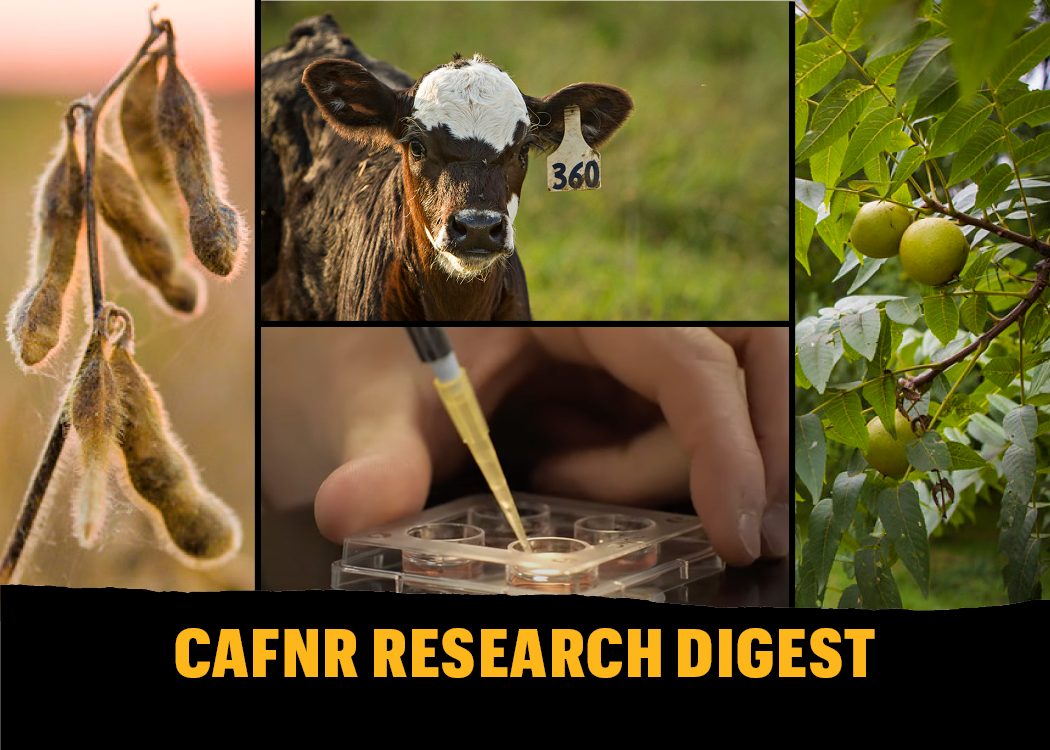|
Center for Regenerative Agriculture Recognized by Missouri Department of Conservation
The CAFNR Center for Regenerative Agriculture (CRA) was recognized with the 2022 External Partner Award by the Missouri Department of Conservation Community and Private Lands Division at its annual banquet in St. Joseph on Oct. 4.
CAFNR Research Symposium Poster Winners Announced
More than 90 posters were showcased at the College of Agriculture, Food and Natural Resources’ first in-person Research Symposium Oct. 12-13. The symposium was held in Memorial Union, and had more than 300 attendees. Winners in three poster categories — undergraduate, graduate and postdoctoral — were announced during the closing session on Thursday. Read the full list of winners on the CAFNR website.
CAFNR faculty members have received the following recent grants (listed by Principal Investigator):
Bongkosh Vardhanabhuti, Establishing Baselines for Soybean Compositions for Plant-based Protein, Agricultural Research Service, 9/1/22-8/31/23, $70,000
Benjamin Knapp, Sustainability of uneven-aged oak forest management in the Missouri Ozarks: how are current practices affecting white oak regeneration and recruitment?, Missouri Department of Conservation, 7/1/22-6/30/23, $143,350
Lisa Webb, Evaluating toxicity implications of wetland sediment insecticide concentrations on benthic aquatic insects and temporal changes in, Missouri Department of Conservation, 7/1/22-6/30/23, $78,403
Felix Fritschi, Thermopriming as a tool to enhance heat stress tolerance in rice (Oryza sativa L.) under field conditions, USDA Foreign Agricultural Service, 9/1/22-8/31/24, $49,976
Kerry Clark, FAS International Internship Program, USDA Foreign Agricultural Service, 10/1/22-9/27/24, $303,958
Kevin Wells, SCGE Disease Models Studies Supplement: Correction of RHO P23H adRP, National Institutes of Health, 6/1/22-5/31/23, $494,470
Joanna Whittier, Science Team Lead for the Fishers and Farmers Partnership of the National Fish Habitat Partnership, Fish and Wildlife Service, 8/1/22-6/30/23, $15,000
Kevin Wells, LATC Collaborative Project 2: Swine Somatic Cell Genome Editing (SCGE) Center, National Institutes of Health, 6/1/22-5/31/23, $66,108
Grant Listings were unavailable for the summer months. We are working to include those grant announcements that haven’t been shared over the next few issues of Research Digest. Below are grants awarded in the month of August:
Allison Meyer, Maternal versus fetal effects on partitioning of nutrients and their effects on epigenomic regulation, National Institute of Food and Agriculture, 9/15/22-9/14/27, $640,000
Bradley Wilson, Evaluation of ThryvON Varieties (SO 140), Bayer Cropscience, LP, 6/15/22-12/31/22, $18,900
Xi Xiong, Service Order 143, Bayer Cropscience, LP, 6/15/22-12/31/22, $38,314
Kiho Lee, Deploying Histotripsy Based Tumor Ablation Strategies to Treat Pancreatic Cancer, VA Tech, 5/1/22-4/30/23, $71,799
Chung Ho Lin, Impact of Long-Term Cover Cropped Organic Farming Practices on the Development of Disease Suppressive Soils, Lincoln University, 9/1/22-7/31/25, $144,391
Christine Elsik, Creating a FAIR data ecosystem for incorporating single cell genomics data into agriculture G2P research, Iowa State University, 6/1/22-5/31/23, $19,990
Benjamin Knapp, Silvicultural strategies for promoting longleaf pine recruitment in multi-aged stands, Joseph W Jones Ecological Research Center, 8/1/22-8/31/24, $27,983
Randall Prather, National Swine Resource and Research Center – Yr 20, National Institutes of Health Office of the Director, 8/1/21-7/31/22, $1,445,966
Bradley Wilson, Evaluation of ThryvON Varieties (SO 138), Bayer Cropscience, LP, 4/1/22-3/1/23, $10,080
Kevin Wells, LATC Collaborative Projects: Swine Somatic Cell Genome Editing (SCGE) Center, National Institutes of Health, 8/1/21-7/31/22, $158,523
Jasper Grashuis, Resilient and Sustainable Small Farms: Lessons from the Covid-19 Pandemic, Lincoln University, 1/1/22-11/30/23, $86,918
Reid Smeda, Service Order 142, Bayer Cropscience, LP, 5/1/22-12/31/22, $13,860
Jinglu Tan, Acquisition of Goods and Services – Vories.Tan sub award, Agricultural Research Service, 4/1/22-10/31/22, $12,727.27
Randall Prather, National Swine Resource and Research Center A&R Adm Sup, National Institutes of Health Office of the Director, 8/1/22-7/31/23, $466,371
Kevin Wells, Swine Somatic Cell Genome Editing Center – Year 4, National Institutes of Health Office of the Director, 6/1/22-5/31/23, $2,295,123
Michael Stambaugh, RUI: Collaborative Research: Medieval to Modern Climate Variability and Climate Change in the Great Plains, NSF Division of Atmospheric Science, 7/1/22-6/30/25, $190,596
Pei Liu, Establishing a food safety model farm as a training center to advance food safety for Hmong farmers in Missouri, National Institute of Food and Agriculture, 7/1/22-6/30/24, $300,000
Rebecca North, Missouri phytoplankton, Mo Department of Health and Senior Services, 3/1/22-8/31/22, $39,125
Kiho Lee, Validating pig models for Alzheimer’s disease, National Institutes of Health National Institute on Aging, 8/1/22-7/31/24, $446,615
Peter Sutovsky, Fertility enhancement of spermatozoa in cattle, Agricultural Research Service, 5/1/22-10/2/25, $194,048
Steven Van Doren, REU Supplement RAPID: Structure of Membrane-Bound Fusion Peptide of SARS-CoV-2 Required for Infection, NSF Division of Molecular Cellular Bioscience, 6/1/20-5/31/23, $20,184
Reid Smeda, Field Trial: Protocol NA22F7B023H, Corteva Agriscience, LLC, 6/15/22-10/1/23, $5,000
|
